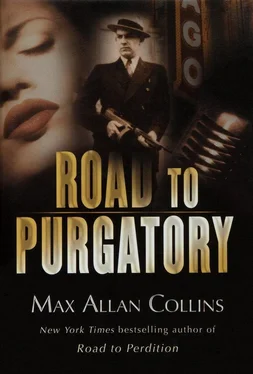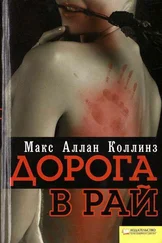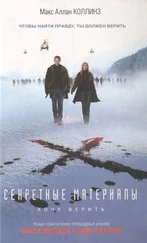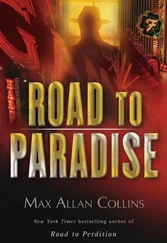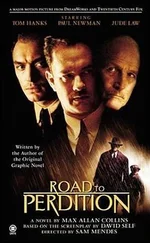Pasquale’s Spaghetti House was larger than a hole in the wall... just. But while the distressed red-brick interior was narrow, the building went back as far as the alley, with a high decorative tin ceiling, which they’d painted out black a few years ago — Papa S.’s idea of remodeling.
Wooden booths with red cushions lined either wall, a scattering of round tables with red-and-white-checkered cloths between. High on the walls perched framed oil paintings, stripe-shirt gondoliers, and commedia dell’arte clowns, acquired by Papa S. at Little Italy street fairs.
The glassed-in area between the dining room and kitchen proper was where Papa and a handful of trusted employees — including Michael, ever since junior high — would toss pizza dough, and feed a hungry oven. The term “pizza” hadn’t caught on in the sticks, and on the menu Papa S. called his exotic specialty “tomato pie.” Some Chicago pizza parlors made a thick crust in a deep dish, but Papa S. provided a thin, crispy variety... and lots of entertainment for those lucky enough to have a seat near that window.
Mama S. did most of the other cooking, and she made the salads, but sauces were another of Papa S.’s bailiwicks. Between them, the smells of homemade-style Italian cooking permeated the place with a distinctive aroma the customers cherished; Michael, living upstairs, had formed his own opinion... though after a year in the Philippines, Michael now inhaled the familiar scents with something approaching delight.
At the moment, however, delight was not his state of mind. As he sat with Papa S., explaining what he wanted, what he needed, the old man’s obvious discomfort was second only to his own.
“These words,” Papa S. said, eyes tight behind wire-frame glasses. His face was round, his mustache white and well trimmed. “I hear them. They’re comin’ out your mouth, son — but they can’t be you.”
“They’re me, Papa.”
“‘Papa’ is it?” The old man snorted a laugh. “You do want this.” Now began the elaborate gestures, the singsong sarcasm. “Usually, it’s ‘sir,’ or ‘Papa S.’ — you always let me know that you know I’m not really your blood papa.”
“I never meant—”
Papa raised a palm. “It’s okay. You weren’t no foundling on our doorstep. We took you in as a grown young man. They told us you had a troubled past. We didn’t care. We loved you. We looked at you, and we loved you.”
Michael knew why. The Satarianos lost a son, ten years of age, to scarlet fever the year before they’d adopted him; pictures of the boy held more than a vague resemblance to Michael. Funny — he’d almost died of scarlet fever himself; but his father had nursed him to health, on the road.
When he’d found the photo album, with the pictures of the lost Antonio, Michael felt strange — as if he’d been chosen by the Satarianos for wrong reasons. He felt like a brown-and-white-spotted puppy picked to replace a dead brown-and-white-spotted dog.
Papa S. was saying, “But when you wanted somethin’, car keys, night off, advance pay, oh, then I was Papa , all right.”
The words were gruff, and even the tone; but the eyes behind the glasses remained kind. Papa S. couldn’t fool Michael. The man was a soft touch. Always had been. Particularly when his adoptive son called him Papa...
Michael leaned forward. “You dealt with these people over the years, didn’t you?”
Papa S. reared back. “Who says I did?”
“Oh, come on, Papa. You were the middleman between the Outfit and the farmers, right?”
“ Gossip you’re believing now? What if I tell you I never had nothing to do with those kind of people.”
“Tell me, then.”
Papa S. said nothing. “I’m gonna get some coffee... You wanna pop or something?”
“Coke.”
Papa got up and lumbered off; he had bad corns, and there was more side-to-side motion than forward movement.
Soon Papa S. was handing a frosty bottle of Coke to Michael; then the old man sat and spooned three spoonfuls of sugar into his coffee.
“Times was different, then,” Papa said softly, stirring, stirring. “Twenty, thirty years ago, we were like coloreds. We had no say, nobody to go to. We turn to the Unione Siciliano, because why? Because there was no place else. Colosimo and Torrio, they were the government to us.”
The same could have been said about the Irish in the Tri-Cities and the Looney mob, Michael knew. Funny — both his fathers had turned to the mob for the only fair shake available to them in America at that time. Only, Pasquale Satariano dealt in produce, and Michael O’Sullivan, Sr., had dispensed muscle.
“Why you wanna work for them, son?”
Michael shrugged, swigged the Coke. “They run a lot of restaurants and clubs. If I get in solid with them, maybe I can manage or own something of my own, someday.”
Papa S. gestured around them elaborately. “ This ’ll be your own, someday!”
“Not sure I want to stay in a small town, Papa. Big world out there.”
Black eyebrows rose. “You don’t think this world, this small-town world, is better than a buncha Japs shooting at your skinny behind?”
“You know as well as I do, a kid with a last name like mine needs connections in the big city. You’ve got them. All I ask is you share them with me.”
“Dangerous people to run with.”
Michael grinned. “Not as dangerous as a buncha Japs.”
A small smile curled under the mustache. “Throw my own words back at me. You’ve changed. Used to be, you were respectful.”
“I still am. I still appreciate everything you and Mama S. have done for me.”
“Mama S.,” the old man said, grunting it, making a sour laugh out of the words. “All she’s done for you is right. This would break her heart, she knew you were with the Mafiosi.”
“Don’t tell her, then.”
Papa S. just stared at him. Then he sipped the coffee. “We could say you’re doing war work in the city. Missions for the army. It’s... what do you say, confidential.”
“Yeah. That should do.”
“Top secret.”
“Right. Like your sauces.”
They smiled at each other.
But then Papa S.’s expression turned grave, and he shook his head. “You honor your country, your honor your family, then you turn around and—”
“I won’t dishonor you, Papa, or my country. You have to trust me in that.”
The old man leaned forward, his voice soft, pleading. “You don’t need to do this, son. With that medal, you can go through all kinda doors. Even with our last name. You’re the first, the very first, Medal of Honor winner! Do you know the pride that swells in my chest?”
“I do know. And I appreciate that, Papa. But you have to do this for me.”
Papa S. studied Michael, who did not avert the gaze, in fact held it.
Then the old man said, “I’ll do this thing for you.”
“Thank you, Papa.”
“Because I love you. Because your mama loves you. And you... you appreciate us.”
The old man stood, and the light hit his eyes; tears were pearled there. Turning away, moving in that shuffling side-to-side gait, Pasquale Satariano headed toward the rear of the building, to the stairs to their living quarters. Michael thought about going to the old man and putting his arm around him and saying, “I love you, Papa, I really do.”
But he didn’t — he didn’t go to the old man, and he didn’t love him, either.
Respected, admired, appreciated him, yes. Adored, venerated, prized Mama S., yes. Not love.
Since the deaths of his parents and brother over ten years ago, Michael had made it a point not to love anybody; puberty had double-crossed him where Patsy Ann was concerned, but that had been his only slip.
Читать дальше
